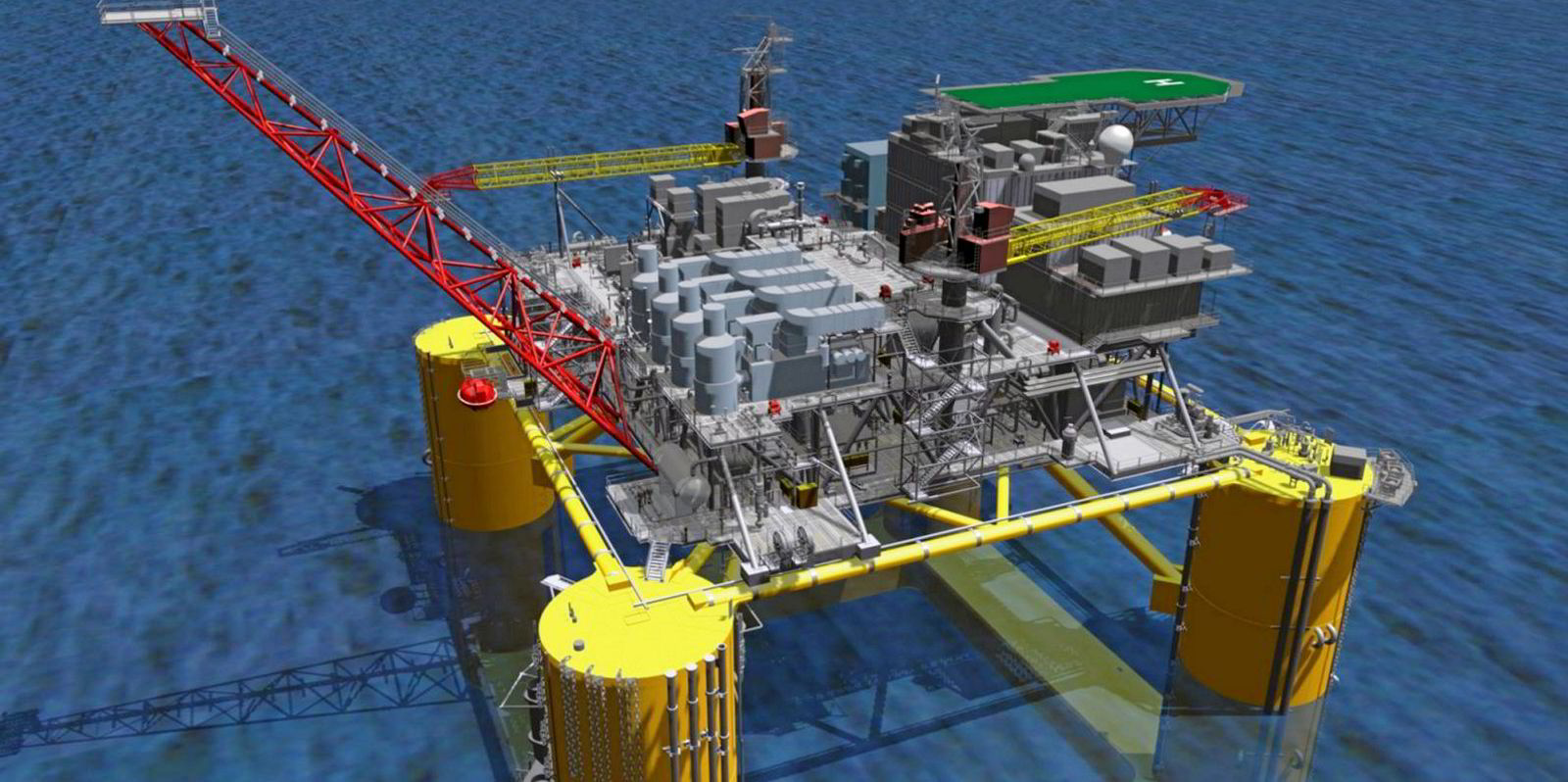BIG OIL BAIT AND SWITCH
Shell committed to its Gulf of Mexico 'production heartland'Operator plans to drill more than 20 exploration wells in the Gulf of Mexico over the next three years

Committed: Shell's recently sanctioned Whale floating production unit is almost a complete replica of the Vito unit, helping the company deliver a low-cost host in the most efficient way possible
Photo: SHELL
17 August 2021
By Jennifer Presley
UPSTREAM
in Houston
Anglo-Dutch supermajor Shell kicked off one of the world's top oil and gas conferences Monday by shedding light on the company's strategy to evolve as it moves forward in the energy transition.
Bill Langin, Shell's senior vice president of deep-water exploration, told Upstream why he believes Shell has an edge in the US Gulf deep-water and why the region has a lower-carbon advantage over other oil and gas plays.
Shell plans to drill 25 to 28 exploration wells in the Gulf of Mexico over the next three years, Langin said on the sidelines of the 2021 Offshore Technology Conference in Houston.
Achieving net zero emissions for Shell will include “some associated emissions for decades to come”, Langin said during an opening panel at the conference.
The company has stated that it will continue to spend about $1.5 billion annually on exploration, with a focus on extending the life of its eight core upstream positions and de-risking its current frontier position by 2025, with no new frontier entries anticipated to occur beyond then.
“We can add value from a financial perspective,” Langin said.
“We think we have the right cost base in places like the Gulf of Mexico, Brazil, Brunei, Malaysia and others. But also, these deep-water positions offer some of the lowest net carbon footprint barrels globally.”
Shell will continue to explore for hydrocarbons as they are part of the “energy mix for decades to come, but we will do it in a very powerful way that allows us to bring together", he said.
Langin said that Shell will continue to leverage its significant position advantages in the Mars and Perdido corridors, as the positions enables scale and synergy.
"Vito in the Mars Corridor and Whale in Perdido build on positions that have been fundamental to the success of Shell over the past couple of decades and allow us to continue to see the Gulf as a core heartland for us for decades to come," he said.

Lurking Leopard found: Shell and Chevron unearth 'significant' deep-water US Gulf discovery
"We see both value and carbon footprints that will allow the Gulf to continue to be a core part of our business."
Low-carbon advantage
Langin explained that Shell sees the deep-water Gulf of Mexico as having among the lowest net carbon footprints of oil that can be produced because it possesses a few intrinsic properties that underpin that belief.
One is the high-pressure nature of the reservoir.
“The higher the pressure of the reservoir, the less energy you have to put in to get the oil out,” he said.
“And if you don’t have to put energy in, it means you don’t have to apply as much pressure at the topsides to push that in; if you need less topsides, less steel to construct it; and so, the whole thing just needs a lot less input than other areas of the world.”
The second property the Gulf of Mexico has in its favour is its long history as an oil and gas basin that has gas takeaway infrastructure.
“We can actually produce, export and sell the associated gas with the fields,” he said.
“And so, you don’t then have to reinject or flare or whatever you might be doing in some other areas around the world that might have higher carbon intensity.”
Langin explained that the Gulf’s third advantage is the high quality of US regulations.
“If you look at the operating standards for our facilities that then drive really high-quality design standards from the very beginning – we design our facilities with those underlying regulations in mind and then we operate to the highest possible standard,” he said.
“Every molecule that we capture and sell and don’t either burn or emit, is better business for us. And so, we want to design our facilities to be zero leaks and make sure that we are as energy efficient as possible.”(Copyright)
Read more
FID at Whale: Shell green lights key deep-water development offshore Gulf of Mexico
Shell’s deep-water Whale takes another leap forward
US Gulf operators set to break through pandemic logjam
17 August 2021
By Jennifer Presley
UPSTREAM
in Houston
Anglo-Dutch supermajor Shell kicked off one of the world's top oil and gas conferences Monday by shedding light on the company's strategy to evolve as it moves forward in the energy transition.
Bill Langin, Shell's senior vice president of deep-water exploration, told Upstream why he believes Shell has an edge in the US Gulf deep-water and why the region has a lower-carbon advantage over other oil and gas plays.
Shell plans to drill 25 to 28 exploration wells in the Gulf of Mexico over the next three years, Langin said on the sidelines of the 2021 Offshore Technology Conference in Houston.
Achieving net zero emissions for Shell will include “some associated emissions for decades to come”, Langin said during an opening panel at the conference.
The company has stated that it will continue to spend about $1.5 billion annually on exploration, with a focus on extending the life of its eight core upstream positions and de-risking its current frontier position by 2025, with no new frontier entries anticipated to occur beyond then.
“We can add value from a financial perspective,” Langin said.
“We think we have the right cost base in places like the Gulf of Mexico, Brazil, Brunei, Malaysia and others. But also, these deep-water positions offer some of the lowest net carbon footprint barrels globally.”
Shell will continue to explore for hydrocarbons as they are part of the “energy mix for decades to come, but we will do it in a very powerful way that allows us to bring together", he said.
Langin said that Shell will continue to leverage its significant position advantages in the Mars and Perdido corridors, as the positions enables scale and synergy.
"Vito in the Mars Corridor and Whale in Perdido build on positions that have been fundamental to the success of Shell over the past couple of decades and allow us to continue to see the Gulf as a core heartland for us for decades to come," he said.

Lurking Leopard found: Shell and Chevron unearth 'significant' deep-water US Gulf discovery
"We see both value and carbon footprints that will allow the Gulf to continue to be a core part of our business."
Low-carbon advantage
Langin explained that Shell sees the deep-water Gulf of Mexico as having among the lowest net carbon footprints of oil that can be produced because it possesses a few intrinsic properties that underpin that belief.
One is the high-pressure nature of the reservoir.
“The higher the pressure of the reservoir, the less energy you have to put in to get the oil out,” he said.
“And if you don’t have to put energy in, it means you don’t have to apply as much pressure at the topsides to push that in; if you need less topsides, less steel to construct it; and so, the whole thing just needs a lot less input than other areas of the world.”
The second property the Gulf of Mexico has in its favour is its long history as an oil and gas basin that has gas takeaway infrastructure.
“We can actually produce, export and sell the associated gas with the fields,” he said.
“And so, you don’t then have to reinject or flare or whatever you might be doing in some other areas around the world that might have higher carbon intensity.”
Langin explained that the Gulf’s third advantage is the high quality of US regulations.
“If you look at the operating standards for our facilities that then drive really high-quality design standards from the very beginning – we design our facilities with those underlying regulations in mind and then we operate to the highest possible standard,” he said.
“Every molecule that we capture and sell and don’t either burn or emit, is better business for us. And so, we want to design our facilities to be zero leaks and make sure that we are as energy efficient as possible.”(Copyright)
Read more
FID at Whale: Shell green lights key deep-water development offshore Gulf of Mexico
Shell’s deep-water Whale takes another leap forward
US Gulf operators set to break through pandemic logjam
No comments:
Post a Comment